

EasyBib: Free Bibliography Maker - MLA, APA, Chicago citation st. Why Plagiarism is Wrong. Teaching and Learning with Technology. Most instructors agree that plagiarism is wrong, but here are some reasons why plagiarism is considered unethical.
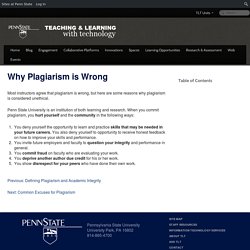
Penn State University is an institution of both learning and research. When you commit plagiarism, you hurt yourself and the community in the following ways: You deny yourself the opportunity to learn and practice skills that may be needed in your future careers. You also deny yourself to opportunity to receive honest feedback on how to improve your skills and performance.You invite future employers and faculty to question your integrity and performance in general.You commit fraud on faculty who are evaluating your work.You deprive another author due credit for his or her work.You show disrespect for your peers who have done their own work. Plagiarism Tutorial: Test Your Knowledge. Plagiarism is a serious academic offense!

The University of Southern Mississippi's undergraduate and graduate bulletins both include statements about plagiarism: "When cheating is discovered, the faculty member may give the student an F on the work involved or in the course. If further disciplinary action is deemed appropriate, the undergraduate student should be reported to the Dean of Students. A graduate student should be reported to the Dean of the Graduate School. " 6 Consequences of Plagiarism. The consequences of plagiarism can be personal, professional, ethical, and legal.
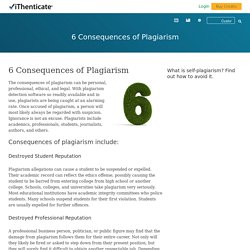
With plagiarism detection software so readily available and in use, plagiarists are being caught at an alarming rate. Once accused of plagiarism, a person will most likely always be regarded with suspicion. Ignorance is not an excuse. Plagiarists include academics, professionals, students, journalists, authors, and others. Destroyed Student Reputation Plagiarism allegations can cause a student to be suspended or expelled. Destroyed Professional Reputation A professional business person, politician, or public figure may find that the damage from plagiarism follows them for their entire career.
Destroyed Academic Reputation. The news magazine for high school. SKIP TO SLIDE 31. Plagiarism. What is Plagiarism and Why is it Important?
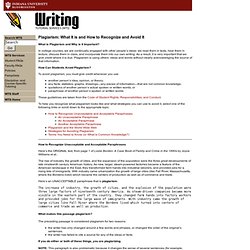
In college courses, we are continually engaged with other people’s ideas: we read them in texts, hear them in lecture, discuss them in class, and incorporate them into our own writing. As a result, it is very important that we give credit where it is due. Plagiarism is using others’ ideas and words without clearly acknowledging the source of that information. How Can Students Avoid Plagiarism? To avoid plagiarism, you must give credit whenever you use another person’s idea, opinion, or theory; any facts, statistics, graphs, drawings—any pieces of information—that are not common knowledge; quotations of another person’s actual spoken or written words; or paraphrase of another person’s spoken or written words. These guidelines are taken from the Code of Student Rights, Responsibilities, and Conduct.
How to Recognize Unacceptable and Acceptable Paraphrases. Real World Examples. Academic Integrity is a serious issue.
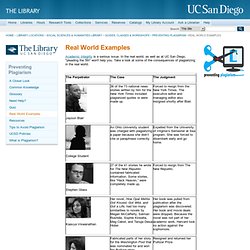
In the real world, as well as at UC San Diego, "pleading the 5th" won't help you. Take a look at some of the consequences of plagiarizing in the real world. Don't let this happen to you! Start practicing academic integrity skills in college, so you'll be ready for the real world! Mendez, Mayita. Wink, Jonathon. Ryan, David L. How to Paraphrase SLIDE 11. U of Albany When Why Cite. What is Plagiarism?
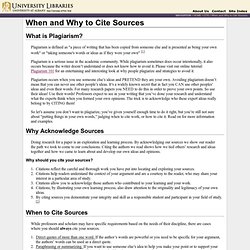
Plagiarism is defined as "a piece of writing that has been copied from someone else and is presented as being your own work" or "taking someone's words or ideas as if they were your own" [1] Plagiarism is a serious issue in the academic community. While plagiarism sometimes does occur intentionally, it also occurs because the writer doesn’t understand or does not know how to avoid it. Please visit our online tutorial: Plagiarism 101 for an entertaining and interesting look at why people plagiarize and strategies to avoid it. Plagiarism occurs when you use someone else’s ideas and PRETEND they are your own. So let’s assume you don’t want to plagiarize, you’ve given yourself enough time to do it right, but you’re still not sure about “putting things in your own words,” judging when to cite work, or how to cite it. Why Acknowledge Sources Doing research for a paper is an exploration and learning process.
Why should you cite your sources? When to Cite Sources Direct quotes. CIIA: Teaching and Learning Resources - Copyright and Plagiarism. Son of Citation Machine. Underlining or Italicizing Titles. Citing Sources and Plagiarism. Facts & Stats — Plagiarism.org. Consequences of Plagiarism. Consequences of Plagiarism It is important to understand that plagiarizing written material serves no purpose other than to detract from the intellectual worth of an assignment, a course, and, ultimately, an education.
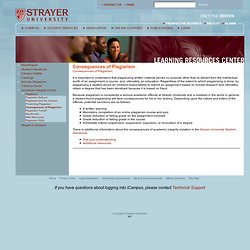
Regardless of the extent to which plagiarizing is done, by plagiarizing a student shuns an inherent responsibility to submit an assignment based on honest research and ultimately obtain a degree that has been devalued because it is based on fraud. Because plagiarism is considered a serious academic offense at Strayer University and a misdeed in the world in general, a student found plagiarizing will face consequences for his or her actions.
Depending upon the nature and extent of the offense, potential sanctions are as follows: There is additional information about the consequences of academic integrity violation in the Strayer University Student Handbook. Consequences of Academic Misconduct and Plagiarism. ICAI. About Integrity in·teg·ri·ty \in-ˈte-grə-tē\ noun 1. adherence to moral and ethical principles; soundness of moral character; honesty.
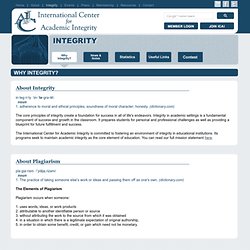
(dictionary.com) The core principles of integrity create a foundation for success in all of life's endeavors. Integrity in academic settings is a fundamental component of success and growth in the classroom. It prepares students for personal and professional challenges as well as providing a blueprint for future fulfillment and success. The International Center for Academic Integrity is committed to fostering an environment of integrity in educational institutions.